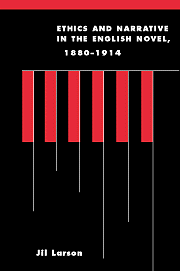Book contents
- Frontmatter
- Contents
- Acknowledgments
- 1 Ethics and the turn to narrative
- 2 Victorian history and ethics: anxiety about agency at the fin-de-siècle
- 3 Emotion, gender, and ethics in fiction by Thomas Hardy and the New Woman writers
- 4 When hope unblooms: chance and moral luck in A Laodicean, The Mayor of Casterbridge, and Tess
- 5 Oscar Wilde and Henry James: aestheticizing ethics
- 6 Promises, lies, and ethical agency in Joseph Conrad's Under Western Eyes
- Afterword
- Notes
- Bibliography
- Index
3 - Emotion, gender, and ethics in fiction by Thomas Hardy and the New Woman writers
Published online by Cambridge University Press: 22 September 2009
- Frontmatter
- Contents
- Acknowledgments
- 1 Ethics and the turn to narrative
- 2 Victorian history and ethics: anxiety about agency at the fin-de-siècle
- 3 Emotion, gender, and ethics in fiction by Thomas Hardy and the New Woman writers
- 4 When hope unblooms: chance and moral luck in A Laodicean, The Mayor of Casterbridge, and Tess
- 5 Oscar Wilde and Henry James: aestheticizing ethics
- 6 Promises, lies, and ethical agency in Joseph Conrad's Under Western Eyes
- Afterword
- Notes
- Bibliography
- Index
Summary
Flirtation, if it can be sustained, is a way of cultivating wishes, of playing for time. Deferral can make room.
Adam PhillipsIn the fiction published in the 1880s and 90s that focuses on the “New Woman” or late Victorian feminist, the break from traditional assumptions about women and ethics is sharp but not definitive. Likewise the rejection of conventional aesthetic choice often leads these writers not to narrative methods that are wholly innovative and successful but to strange experiments. In this transitional literature, written during a period of cultural upheaval, the exaggerated and the extravagant invade realism, as if to startle readers out of their complacency. Formal innovations enable the exploration of a new sexual ethics. In keeping with Victorian novelistic tradition, the New Woman writers tell stories about love and marriage. But marriage is no longer the goal toward which everything inevitably tends; it is, instead, an object of the text's ethical scrutiny. As Teresa Mangum notes in her study of Sarah Grand and the New Woman novel, “Promoting the interests of women, these novels work to remake marriage, a framework shaping so many women's lives, into a fictional structure and an institution that would give women power, control, authority, security, respect, and, most significantly, agency.” As in other late-century fiction, New Women writing betrays an insecurity about choice and agency, provoked in this case by the political and social consequences of gender inequity.
- Type
- Chapter
- Information
- Ethics and Narrative in the English Novel, 1880–1914 , pp. 44 - 63Publisher: Cambridge University PressPrint publication year: 2001



